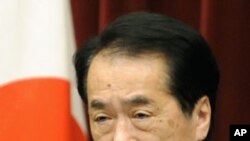Japanese Prime Minister Naoto Kan told his nation Friday that together they would "create Japan once again from scratch."
He said that the earthquake-tsunami disaster coupled with the nuclear crisis was a "great test" for the people of Japan, but that the nation would overcome the tragedy and recover.
Japan on Friday observed a moment of silence one week after the massive earthquake and tsunami, which has killed more than 6,400 people. There are an estimated 10,000 still missing.
Crews on Friday worked to repair damaged roads and volunteers struggle to deliver food, water, blankets and medicine to survivors, but conditions are deteriorating in shelters across the country's northeast, where more than 300,000 people are taking refuge.
Japan's NHK television reported Friday that 25 people, most of them elderly and some of them bedridden, had died in the shelters. Mao Sato, who works for the Japanese relief organization Peace Winds told VOA from Tokyo that the number of deaths in shelters is increasing every day as survivors battle bitter cold weather.
Sato said some of the devastated areas have "almost run out of food" and some people are only eating two portions of rice a day. Sato said local officials also had asked her organization to provide emergency shelters to house the bodies of those killed in the magnitude nine earthquake and killer tsunami.
Fuel shortages, power outages and freezing weather have slowed relief efforts.
Mr. Kan offered his condolences to his nation, and acknowledged there had been a great deal of confusion around the delivery of relief goods. But he said there was no time to be pessimistic and called on the Japanese to work together to rebuild the nation.
Japan's Red Cross says hospitals and evacuation centers also are running out of medical supplies.
Mr. Kan called for people to be patient, and said the government would provide blankets and relief goods.
Japan's NHK television showed pictures of elderly wrapped in blankets, while some people continued to search for their missing loved ones through the rubble in northeast Japan.
Many parts of Japan are experiencing rolling blackouts as the emergency tests the country's power capacity. The government also has asked railway operators to reduce train service to lessen the strain on the electrical system.
Sato said that in Tokyo, rolling blackouts were affecting the train system and the hours that people can work. She said that restaurants and stores are not functioning properly and that supermarket shelves are getting empty as back stocks are rushed to emergency areas.
Foreign governments are pulling their citizens out of Japan, and the U.S. State Department said the first flight carrying American evacuees lifted off Thursday. The United States has warned citizens about the deteriorating situation at the crippled Fukushima Dai-Ichi nuclear power plant, and ordered Americans to stay at least 80 kilometers away.
U.S. President Barack Obama Thursday defended the recommendation of the evacuation zone even though it is far larger than the zone recommended by Japanese officials. He told reporters the U.S. decision was based on a careful scientific evaluation.
Britain, China and France are among the other foreign governments arranging transportation out of Japan for their citizens.




